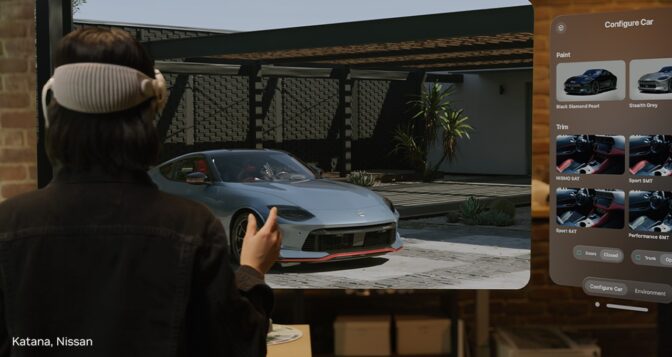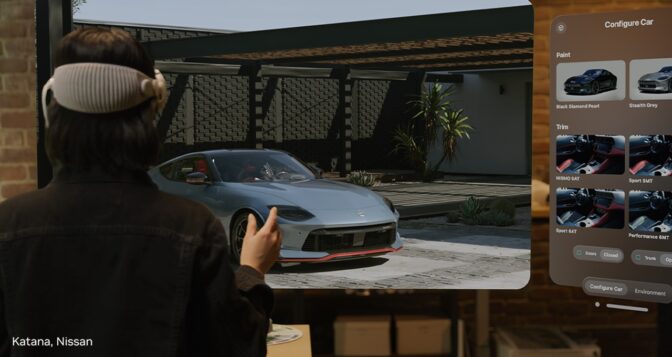From designing dream cars to customizing clothing, 3D product configurators are ringing in a new era of hyper-personalization that will benefit retailers and consumers.
Developers are delivering innovative virtual product experiences and automated personalization using Universal Scene Description (aka OpenUSD), NVIDIA RTX technologies from NVIDIA Omniverse software development kits (SDKs) and application programming interfaces (APIs), and generative AI from NVIDIA Edify models.
Together, these technologies enable developers to create configurator applications that deliver physically accurate, photoreal digital twins of products, revolutionizing the way brands personalize buyer journeys at unprecedented scale.
For example, Dassault Systèmes’ 3DEXCITE brand is adopting Omniverse Cloud APIs to enable interoperability with generative AI services, such as Shutterstock’s Edify3D or Edify 360, directly inside its web-based application.
By using NVIDIA Edify-powered models, trained by Shutterstock, Dassault Systèmes can generate stunning 3D environments from text prompts to instantly personalize scenes representing physically accurate products. And with Omniverse APIs, the company can supercharge the web-based app with real-time ray-traced rendering.
Many other developers are also building 3D product configurator software and solutions with NVIDIA Omniverse SDKs and APIs.
CGI studio Katana has developed a content creation application, COATCreate, used by manufacturers such as Nissan, that allows marketing assets to be staged and created faster with product digital twins. COATCreate also enables users to view and customize the digital twin while wearing an Apple Vision Pro headset, unlocking real-time ray-traced extended reality experiences.
Brickland, another CGI studio, is developing real-time virtual experiences that allow users to customize clothing by choosing from predefined parameters such as color and material. Through their Digitex initiative, Brickland is expanding into digital textures and allowing consumers to visualize and interact with extreme levels of detail in their 3D assets thanks to RTX real-time rendering
Configit connected its powerful configurator logic tool Configit Ace to Omniverse and OpenUSD by streamlining the management of the complex rules system behind the creation of configurators and combining it with the rendering capabilities of Omniverse and RTX. This allows for rapid creation of articulated product configurators and enables the configurator developers to power real-time ray-traced rendering in their solutions.
WPP has developed a content engine that harnesses OpenUSD and AI to enable creative teams to produce high-quality commercial content faster, more efficiently and at scale while remaining aligned with a client’s brand.
Media.Monks has developed an AI-centric professional managed service that leverages Omniverse called Monks.Flow, which helps brands virtually explore different customizable product designs and unlock scale and hyper-personalization across any customer journey.
Accenture Song, the world’s largest tech-powered creative group, is using Omniverse SDKs to generate marketing content for Defender vehicles. Using it with the Edify-powered generative AI microservice, Accenture Song is enabling the creation of cinematic 3D environments via conversational prompts.
Product Digital Twins in the Era of Industrial Digitalization
Forecasts indicate that consumer purchases, including high-value items like vehicles and luxury goods, will increasingly take place online in the coming decade. 3D product digital twins and automated personalization with generative AI serve as invaluable tools for brands to showcase their products and enhance customer engagement in the changing retail landscape.
3D configurators provide tangible benefits for businesses, including increased average selling prices, reduced return rates and stronger brand loyalty. Once a digital twin is built, it can serve many purposes and be updated to meet shifting consumer preferences with minimal time, cost and effort.
Creating a 3D Product Configurator
The process of creating a 3D product configurator begins with harnessing OpenUSD’s powerful composition engine and interoperability. These features enable developers to create dynamic, interactive experiences that accurately reflect the nuances of each product.
Teams can also integrate generative AI technologies into OpenUSD-based product configurators using NVIDIA Omniverse APIs to enhance the realism and customization options available to users. By leveraging AI, configurators can intelligently adapt to user inputs, offering personalized recommendations and dynamically adjusting product configurations in real time. And with NVIDIA Graphics Delivery Network , high-quality, real-time viewports can be embedded into web applications so consumers can browse products in full fidelity, on nearly any device.
The possibilities for 3D product configurators are virtually limitless, applicable across a wide range of industries and use cases.
To start, get NVIDIA Omniverse and follow along with a tutorial series.


